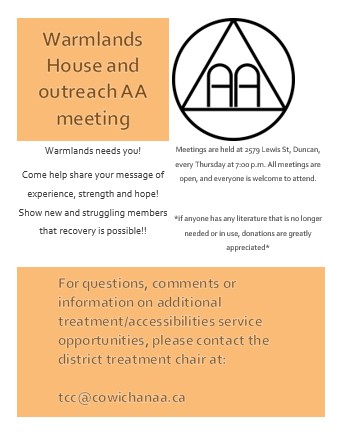
Current District 8 Service Positions Available! (see bottom of page).
Want to get into service in A.A. but don’t quite know where to start? All levels of service have opportunities available! A great place to start is to join a Home Group and attend the business meetings. Another way to be of service can be found at the District level. Here in the Cowichan Valley, District 8 is comprised of many Service Committees, all with different opportunities available for our fellowship members. See the list below and click to learn more!
Current District Service Positions Available!
(As of June 10, 2025.)
*PI/CPC Chair:
The purpose of the public information committee is to carry the AA message to the alcoholic who still suffers. Utilizing literature and service material available on the A.A. World Services Website and working together, the members of the committee convey information to the general public, schools, students and media professionals. Questions pertaining to anonymity of AA members at the public level, what AA does and does not do, and how we can be found are our prime focus. The public information chair also works closely with the website committee overseeing our Area 79 Website and maintains the content of the “About AA” pages. It is also important to be in contact and available to DCM’s and District PI Committee Chairs for matters concerning PI at a district level.
The purposes of the CPC committee are:
To attempt to establish better communication between AAs and professionals, and to find simple, effective ways of cooperating without affiliating.
To bring the AA message to professionals, and students, at professional schools in the community, helping them understand how and why AA works.
A.A. has always valued friends in all professional fields. These associations have been mutually beneficial and completely in keeping with the AA Traditions. Cooperating with non-alcoholic professionals is an effective way to carry the message to the sick alcoholic, as they may be reached sooner with the help of informed non-AAs.
Provide information about AA to those who have contact with alcoholics through their profession. This group includes health care professionals, educators, members of the clergy, lawyers, social workers, union leaders, government officials as well as those working in the field of alcoholism.
Inform this group of professionals about where we are, what we are, what we can do, and what we cannot do.
Work in cooperation with the Corrections, Public Information and Treatment/Accessibilities Committees.
*Corrections Chair:
Our purpose is to carry the AA message to alcoholics in correctional systems through the activities of AA members, groups and committees. We do this by assisting individuals, groups and districts in carrying the AA message to alcoholics confined in correctional facilities, recently released from jail, or participating in a correctional program. The committee has been focusing on information which will go up on this web site, which will include institutional meeting lists and information on the Pre-Release Program. Federal clearance forms are available from the Corrections Committee Chair.
The corrections chair is also responsible for ensuring an Area 79 presence at two semi-annual, week long John Howard Society Information Fairs in the Pacific Region, in April and September. The corrections committee provides AA literature to ‘inside’ AA groups and encourages ‘outside’ AA members to assist in this project, either by donating new or used AA literature or by contributing to its purchase through donations to “Pink Can” program(s), locally or at AA events.
*Remote Communities Chair:
To foster unity within the fellowship of Area 79 by creating an awareness of the needs of alcoholics in remote communities. This committee seeks to assist those who are unable to make it to regular face-to-face meetings on a consistent basis. Members may be faced with travel or geographic challenges or may face barriers such as language, cultural considerations and/or anything else that could separate a person who needs A.A. from our lifesaving program of recovery.